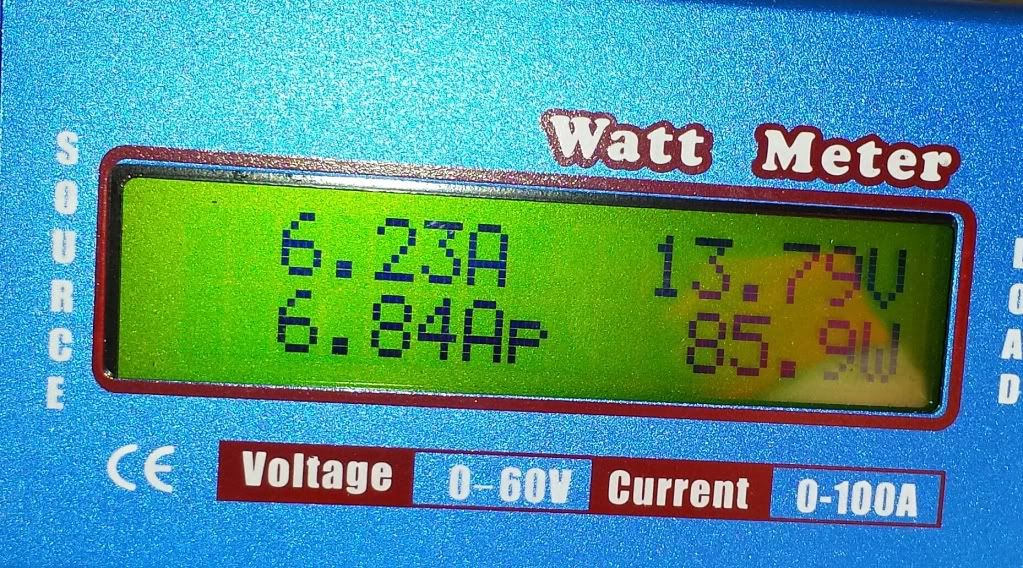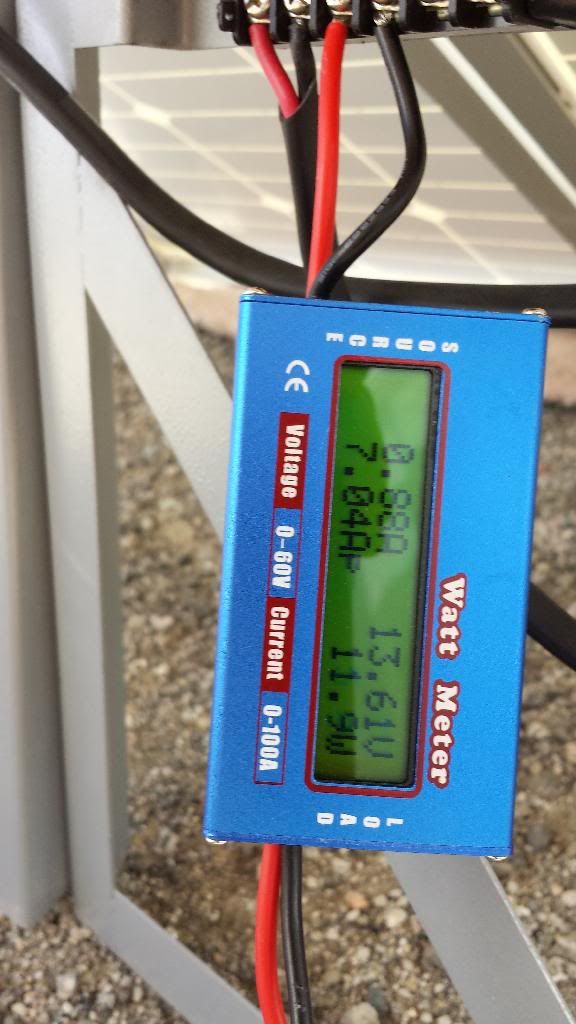- Good Sam Community
- Everything RV
- Technical Issues
- Portable Solar Panel Question
- Subscribe to RSS Feed
- Mark Topic as New
- Mark Topic as Read
- Float this Topic for Current User
- Bookmark
- Subscribe
- Mute
- Printer Friendly Page
Portable Solar Panel Question
- Mark as New
- Bookmark
- Subscribe
- Mute
- Subscribe to RSS Feed
- Permalink
- Report Inappropriate Content
Mar-13-2014 02:30 PM
So my questions for you guys is:
1) How much does the weight of a solar panel affect the quality?
2) Is there other factors in the specs of the 3 panels listed below that should be a bigger factor in influencing my decision?
Product A
Manufacturer: W Solar
Max Power: 75W
Open Circuit Voltage (Voc): 23.36V
Short Circuit Current (Isc): 4.17
Maximum Power Voltage (Vmp): 18.0V
Maximum Power Current (Imp): 4.28A
Weight: 15 pounds
Dimensions (inches): 38.61 x 23.79 x 1.17
Cu Inches: 1075
$1.40/watt
Product B
Renogy Solar Panel
Maximum Power at STC: 100 W
Open - Circuit Voltage (Voc): 22.5 V
Short- Circuit Current (Isc): 5.75 A
Optimum Operating Voltage (Vmp): 18.9V
Optimum Operating Current (Imp): 5.29 A
Weight: 16.5 lbs
Cu Inches: 1402
Dimensions: 47 x 21.3 x 1.4 in
$1.50/watt
Product C
Manufacturer: Solar Cynergy
Max Power: 100W
Open Circuit Voltage (Voc): 21.0V
Short Circuit Current (Isc): 6.30A
Maximum Power Voltage (Vmp): 17.0V
Maximum Power Current (Imp): 5.80A
Weight: 25 pounds
Dimensions (inches): 44.00 x 26.50 x 1.25
Cu Inches: 1458
$1.31/watt
- Mark as New
- Bookmark
- Subscribe
- Mute
- Subscribe to RSS Feed
- Permalink
- Report Inappropriate Content
Mar-17-2014 06:21 AM
My 230w portable weighs over 50 lbs and it hasn't been toppled by the high winds we get as long as it's at least partially facing them. I can move it around with ease except for in and out of the trailer. There I need Honeys help so that nothing gets nicked up in the process.
It is also to big to easily fit in a car or loaded truck/ SUV, so it will be harder to conceal if it is ever taken.
2003 Ford Expedition with 435w tilting portable/ TS-MPPT-45
750w solar , TS-MPPT-60 on the trailer
675 Ah bank, Trip-lite 1250fc inverter
Sportsman 2200w inverter generator
- Mark as New
- Bookmark
- Subscribe
- Mute
- Subscribe to RSS Feed
- Permalink
- Report Inappropriate Content
Mar-16-2014 09:30 PM
vermilye wrote:
You might want to consider some of the folding panels available from Solar Blvd. They include a PWM controller, cable, etc. I have their 160 watt panel @ $239.00 & have been pleased with the performance (although the weight listed on their specifications is wrong - it is around 30 lbs)
Cheap imports from China, but far less expensive than most of the folding panel kits from other manufacturers.
The weight in their specifications is in Kg, not in pounds. Multiply by 2.2 to get approximate weight in pounds.
I have their 120 watt version, and was amazed yesterday, and it's not even spring yet, to be getting a measured 7.04 Amps out of that 120 watt mono crystal panel on March 15th.
 This was Oct 25th, 2013.
This was Oct 25th, 2013.This was March 15th, 2014.

- Mark as New
- Bookmark
- Subscribe
- Mute
- Subscribe to RSS Feed
- Permalink
- Report Inappropriate Content
Mar-15-2014 10:57 AM
Cheap imports from China, but far less expensive than most of the folding panel kits from other manufacturers.
- Mark as New
- Bookmark
- Subscribe
- Mute
- Subscribe to RSS Feed
- Permalink
- Report Inappropriate Content
Mar-14-2014 12:00 PM
AStinker- wrote:
I am considering 2 of the 75 watt panels and connecting them directly to my batteries without a controller
Don't.
Westend is right, with 150W array you need a controller. I would say - you need a controller with any array larger than 25W.
- Mark as New
- Bookmark
- Subscribe
- Mute
- Subscribe to RSS Feed
- Permalink
- Report Inappropriate Content
Mar-14-2014 11:19 AM
You will want a controller, even a basic PMW E Bay special. Without a controller there is a possibility of either treating your batteries badly or pushing too much power through your RV's 12V system. This could result in loss of circuit boards, lights, and other 12V devices.
Good luck on your solar charging, it's a very sweet deal, once installed.
'71 Starcraft Wanderstar -- The Cowboy/Hilton
- Mark as New
- Bookmark
- Subscribe
- Mute
- Subscribe to RSS Feed
- Permalink
- Report Inappropriate Content
Mar-14-2014 10:53 AM
Whatever, two of those at 150w would get you Isc of 8.4 which is low for 150w. My 130w gets 8.2. A 150 should get 150/130 x 8.2 = 9.46a
I don't know what the weight issue is here, but I am using a 130w panel as a portable that weighs 31 lbs (has heavy frame) and I find it no trouble at all. ( I am 165) I do have more difficulty carrying my 230w panel around though, that weighs 48.5 lbs. Makes the 130w feel easy!
on Ford E350-460-7.5 Gas EFI
Photo in Profile
2. 1991 Bighorn 9.5ft Truck Camper on 2003 Chev 2500HD 6.0 Gas
See Profile for Electronic set-ups for 1. and 2.
- Mark as New
- Bookmark
- Subscribe
- Mute
- Subscribe to RSS Feed
- Permalink
- Report Inappropriate Content
Mar-14-2014 10:07 AM
Almot wrote:
The heavier of B and C also has 10% larger area. Which simply means - less efficient per sq.ft. Though, being not 10% but the whole 50% heavier, it most likely means - better frame and/or thicker glass. A stronger product, in other words.
It is interesting that they put Cu.inches in the specs - to me this number is non-informative.
Isc doesn't mean much, with MPPT controller. With PWM - yes, it does.
Btw, I will never understand why somebody would NOT want a solar, at today's prices. Bolt 200-300w to the roof and forget about it. It may or may not be the only or the main source of power depending on your situation, but there is no loss here. It will be charging your batteries in between (and sometimes - instead of) generator runs. Though, 100w is more a supplementary energy source, not something to rely on.
Sorry, the Cu. inches was not in the specs but a calculation I had in my notes trying to understand the weight differences.
A supplementary energy source is what I am looking at short term. Actually I am considering 2 of the 75 watt panels and connecting them directly to my batteries without a controller as my energy usage will be greater than 150 watts of panel can generate.
- Mark as New
- Bookmark
- Subscribe
- Mute
- Subscribe to RSS Feed
- Permalink
- Report Inappropriate Content
Mar-14-2014 10:00 AM
BFL13 wrote:
Weight does not affect performance as such, where exra weight might be in a heavier frame. Check frame depth in inches. some are 1 inch some are 1 1/2 inch. Sometimes a stronger panel frame is good if your portable stand contraption is not strong.
You care about the Isc rating in amps because that is what you should expect with a panel pointed at a high sun.
Your list:
A. You seem to have the Isc and Imp reversed
B. Isc is low for the wattage, see
C. Where Isc is correct for a 100w panel (6.3a)
IMO C is the better choice here.
I see what you mean about "A. You seem to have the Isc and Imp reversed" so I double checked the Isc & Imp for A and that is what the spec sheet shows. That is actually the one I am leaning towards. Is that something I should be concerned about BFL13?
And I agree C is the better choice except for the weight. If I disregard weight I can get 140 watt panels that weigh only 5 lbs more (30 lb)and have 8.4A Isc for a better price but not sure if I want to deal with the 25 or 30 lb panels.
- Mark as New
- Bookmark
- Subscribe
- Mute
- Subscribe to RSS Feed
- Permalink
- Report Inappropriate Content
Mar-13-2014 07:46 PM
But the OP is not looking for kits, he is looking for panel. Which is the way to go.
- Mark as New
- Bookmark
- Subscribe
- Mute
- Subscribe to RSS Feed
- Permalink
- Report Inappropriate Content
Mar-13-2014 07:15 PM
Liberty is meaningless where the right to utter one's thoughts and opinions has ceased to exist. That, of all rights, is the dread of tyrants. --Frederick Douglass
photo: Yosemite Valley view from Taft Point
- Mark as New
- Bookmark
- Subscribe
- Mute
- Subscribe to RSS Feed
- Permalink
- Report Inappropriate Content
Mar-13-2014 06:57 PM
I asked the guy what that was about and he said they got a "smoking deal" on those which is why the price. I said you can get the panel around here for $200 (actually not, but you can get a 100w for $125, so call it 200w for $250) and the controller for $30 plus pay whatever for the other bits and pieces.
In fact, still out of sight for price, but just down the road a ways, the same kit is going for $509
http://www.wegosolar.com/products.php?product=145-Watt-Solar-RV-Kit-with-30A-Flush-Mount-Controller
He got sort of angry looking and stomped out to go check around his collection of trailers for sale, while I went my way. I don't think I will shop at that RV place anymore for parts! 🙂
on Ford E350-460-7.5 Gas EFI
Photo in Profile
2. 1991 Bighorn 9.5ft Truck Camper on 2003 Chev 2500HD 6.0 Gas
See Profile for Electronic set-ups for 1. and 2.
- Mark as New
- Bookmark
- Subscribe
- Mute
- Subscribe to RSS Feed
- Permalink
- Report Inappropriate Content
Mar-13-2014 06:11 PM
It is interesting that they put Cu.inches in the specs - to me this number is non-informative.
Isc doesn't mean much, with MPPT controller. With PWM - yes, it does.
Btw, I will never understand why somebody would NOT want a solar, at today's prices. Bolt 200-300w to the roof and forget about it. It may or may not be the only or the main source of power depending on your situation, but there is no loss here. It will be charging your batteries in between (and sometimes - instead of) generator runs. Though, 100w is more a supplementary energy source, not something to rely on.
- Mark as New
- Bookmark
- Subscribe
- Mute
- Subscribe to RSS Feed
- Permalink
- Report Inappropriate Content
Mar-13-2014 03:27 PM
You care about the Isc rating in amps because that is what you should expect with a panel pointed at a high sun.
Your list:
A. You seem to have the Isc and Imp reversed
B. Isc is low for the wattage, see
C. Where Isc is correct for a 100w panel (6.3a)
IMO C is the better choice here.
on Ford E350-460-7.5 Gas EFI
Photo in Profile
2. 1991 Bighorn 9.5ft Truck Camper on 2003 Chev 2500HD 6.0 Gas
See Profile for Electronic set-ups for 1. and 2.
- Solar wiring and other questions in Technical Issues
- New to Solar. Conect directly to battery ???? in Technical Issues
- How much capacity is lost if converter isn't Li-friendly? in Technical Issues
- Solar inverter -- shore power question in RV Tips & Tricks
- Electrical Question-Breaker panel does not cut all power in Technical Issues





